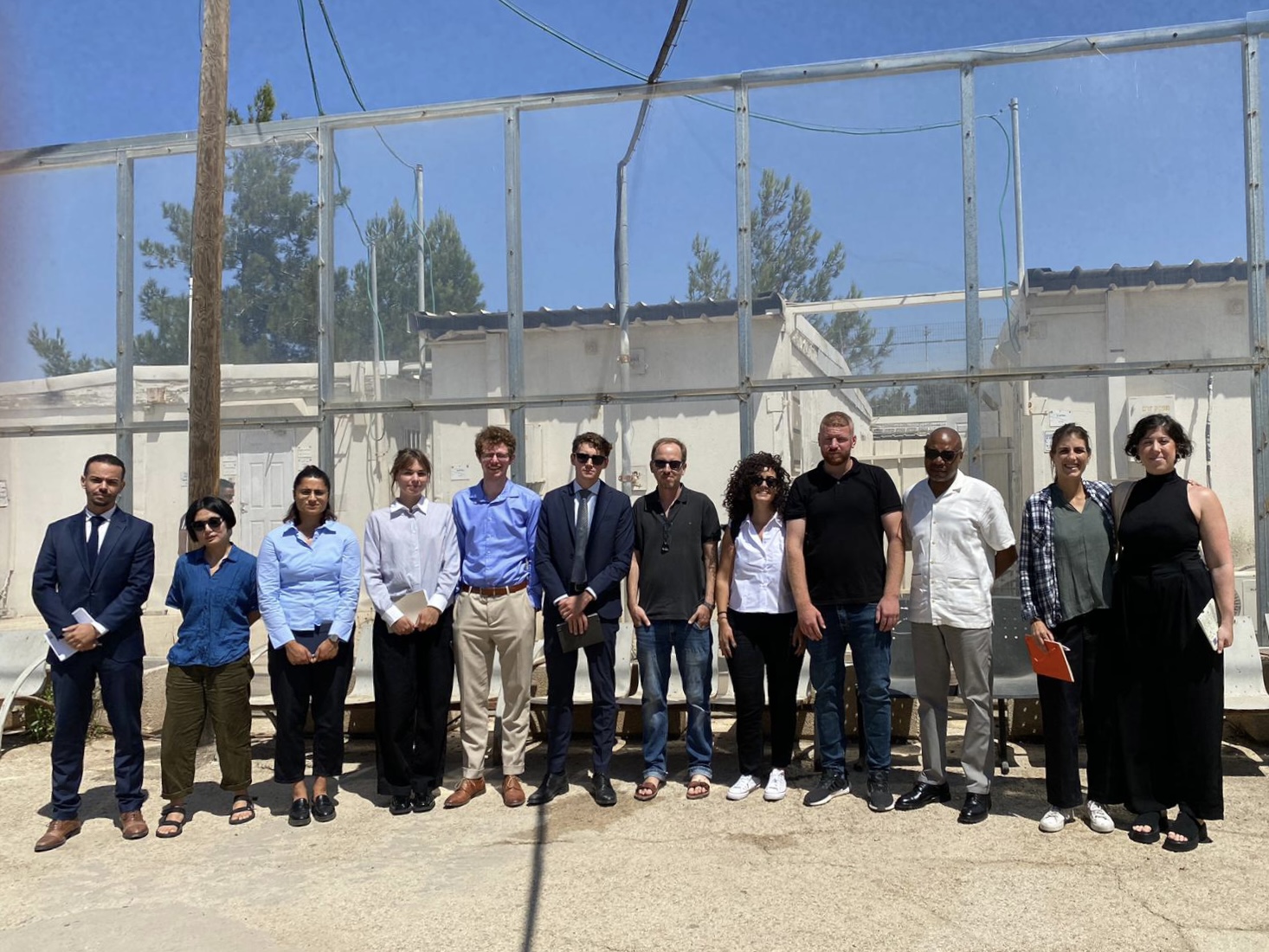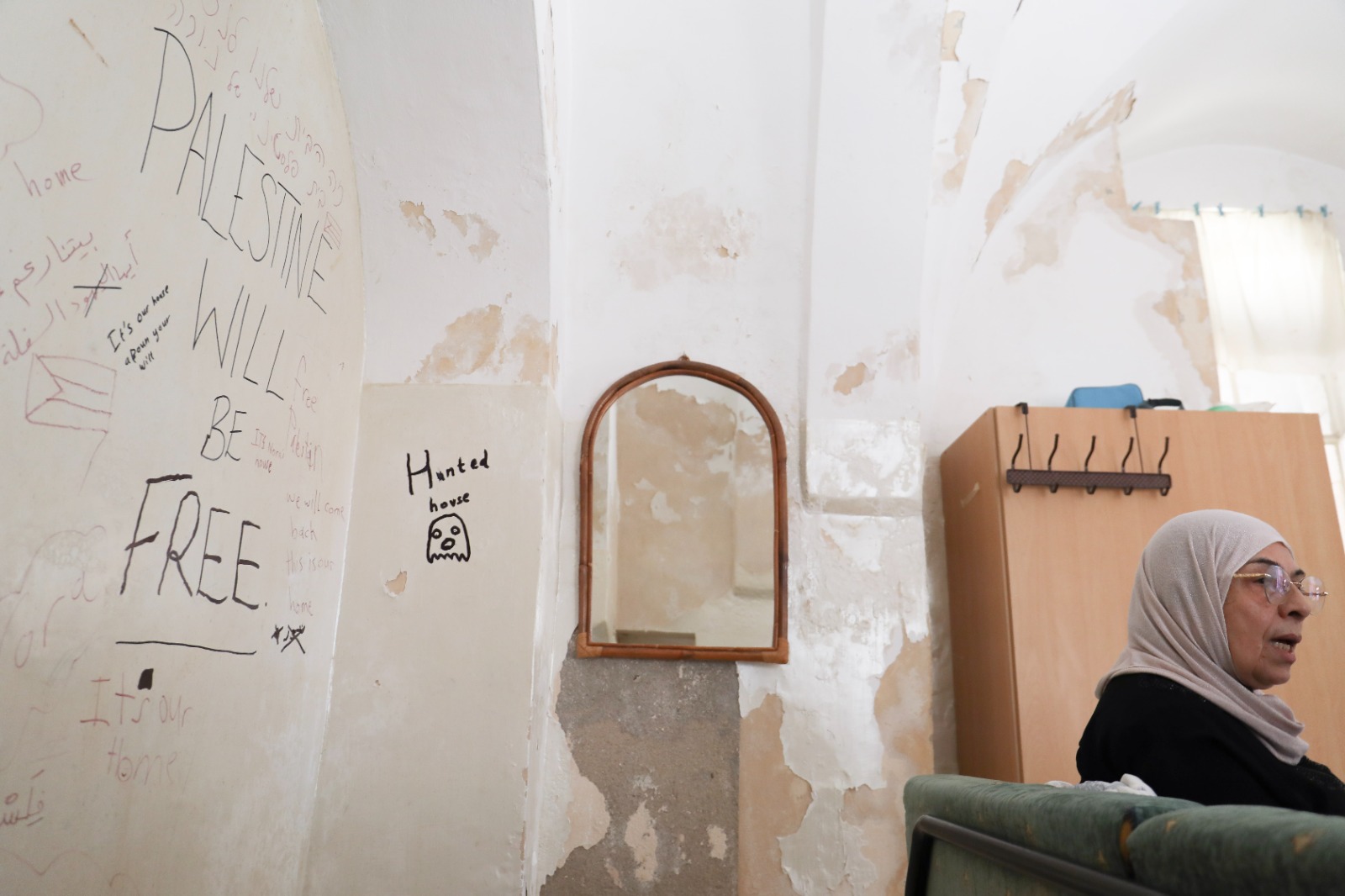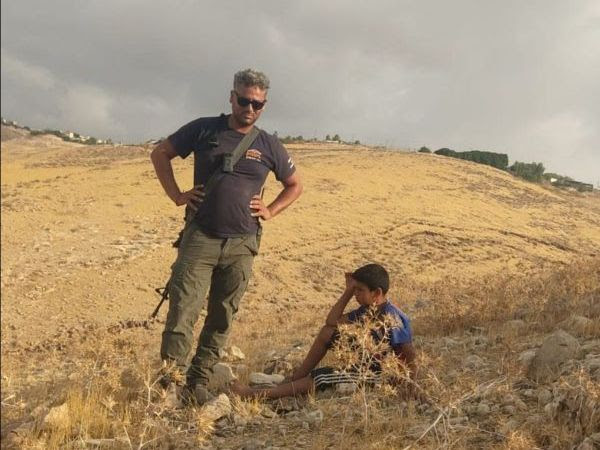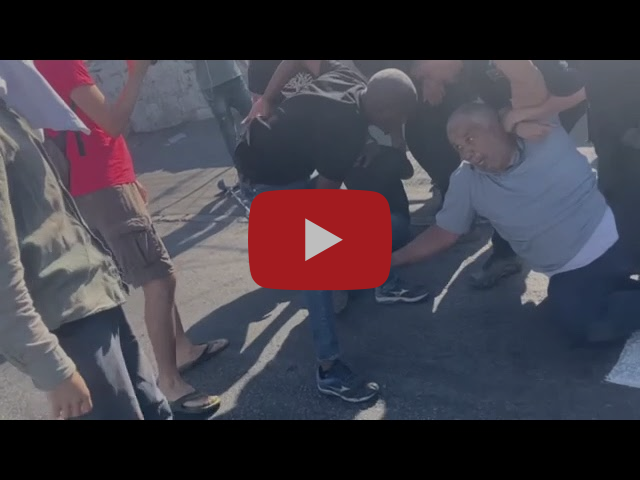The State of Human Rights Defenders – Summer 2023 Newsletter
Newsletter Contents
- Political Developments Round-Up
- Outcomes of Military Court Trials: Sami Huraini, Nasser Nawajah, Issa Amro
- Legal Win in SLAPP suit against former Peace Now director Yariv Oppenheimer
- Arrests during the evictions of the Sub-Laban Family
- The Wrongful Arrest of B’tselem Documenter Who Was Victim of Settler Attack
- Arbitrary Detentions in the South Hebron Hills
- Palestinian Girls Arrested After Extremist Settler Torments Young Boy in Khan Al Ahmar
…………………………
|
|
|
|
|

Members of the diplomatic community show up in support of Sami Huraini during his verdict hearing on August 22. (Sami stands fourth from right, Adv. Riham Nassra fifth from right.) Photo credit: HRDF.
Plea Bargain in the Sham Trial of Nasser Nawajah
Nasser Nawajah is a longtime human rights defender who has worked as field researcher at the eminent human rights organization B’Tselem for 15 years. He is a resident of the Palestinian village of Susiya in Masafer Yatta (the site of several successive expulsion and land expropriation attempts by the Israeli state and military since the 1980s), and is one of the main reasons human rights organization have so much data and documentation around the human rights violations occurring in the South Hebron hills. He puts himself at risk on a daily basis to document demolitions, settler violence, and military abuses, and pays the price for this by being consistently harassed, intimidated, and targeted by the military. (Read about one such 14-hour ordeal of arbitrary detention and psychological torture, for the sole purposes of threatening Nawajah, which occurred in the summer of 2022, here).
In May of 2022, Nawajah was indicted with assaulting a soldier during an incident that occurred in September 2021. Read about the background to this case here. This charge was completely baseless – Nawajah was never even arrested during the event in which the incident supposedly occurred and was only summoned for interrogation three weeks later. Prosecution did not bring forward any substantial evidence beside the witness testimony from the border police officer who alleged the assault. According to his testimony, the officer received a blow to the right side of his torso while he was assisting another officer in “neutralizing” a Palestinian village resident. He claims that he then turned around, “made eye contact” with Nasser, and watched as Nasser ran away in the other direction. When asked on the stand how he knew it was Nasser who punched him, the officer simply responded: “I know him!” without providing any more specific details as to how it was that he could identify Nasser as the alleged assailant. Prosecution did not bring forward any medical records, video footage, or photographic documentation to substantiate the claim the Nawajah committed this assault, let alone that this officer was even punched at all.
Throughout the testimony, the officer repeated again and again that Nasser Nawajah is one of the most well known figures in the south Hebron hills, and that “everyone — police officers, soldiers, commanders — everyone” knows Nasser. He intended this to disparage Nasser’s relentless documentation work as a thorn in the side of soldiers and those serving the Israeli Occupation Forces (stating explicitly that because of Nasser’s documentation work they are unable to carry out their missions without local resistance). For instance, he mentioned that when they go to demolish a house, if Nasser is there filming, “the residents of the home will resist the demolition by not evacuating the premises quietly…” as if the problem is Nasser’s documentation, and not the demolition itself. Of course, this is exactly the point… But it also points to how successful Nasser is in documenting human rights violations all throughout the south Hebron hills. It is not a huge leap to make to understand why Nasser would then be targeted in this way to put a stop to his documentation work.
It is undeniable that this case was a sham trial, based on baseless charges, with the clear intent of targeting and criminalizing Nasser to force him to cease his work. Despite all of this, Nasser chose in the end to secure a plea bargain with prosecution in July 2023, because he understood the harsh reality of the military court system and did not want to risk conviction despite his innocence. This plea deal reduced the charges from assault of a soldier to obstruction of a soldier, with a suspended prison sentence of 1.5 months and a suspended fine of 3,000 shekels if he is to be convicted of either assault or obstruction again over the next 1.5 years.
Because of this suspended sentence, Nawajah now has a target on his back even more than before. Soldiers and border police who are perturbed by Nawajah’s documentation work will have even more reason to target and harass him and look for any reason they can to arrest him again in order to increase the likelihood of imprisoning him. However, for the time being, Nasser does not risk prison time, and he has avoided being convicted of a violent charge.
Partial Legal Victory – Issa Amro
In June, the seven-year long military court trial of Issa Amro concluded, with our appeal successfully overturning two out of six of the original convictions. The judge also reduced the original suspended prison sentence, with the suspended sentence time frame already expired, ensuring that Amro does not face imprisonment.
Issa Amro leads the Youth Against Settlements organization in Hebron, and has campaigned for years against the settler and military takeover of Hebron, and against the creation of “sterile streets” and the massive proliferation of checkpoints that deny Palestinians freedom of movement within the city. In 2016 he was indicted on 18 charges over five different incidents, all of which were intended to curb his right to freedom of expression, freedom of speech, freedom of assembly, and freedom of protest.
We are happy that the appeal was partially successful – we ultimately secured acquittals for 14 out of 18 counts throughout the course of the entire trial, 2 of which were during the appeal, and secured a reduced sentence that ensured Amro will not face any prison time. For this we can only thank our incredible lawyers, Adv. Riham Nassra and Adv. Michal Pomeranz, who led the case during the appeal trial, and formerly HRDF-funded lawyer Adv. Gaby Lasky, who helmed the case with Nassra during the initial trial proceedings. On the other hand, however, we were disappointed to see that the judge took no principled stance against the violations in freedom of expression, freedom of speech, and freedom of assembly that are part and parcel of upholding the remaining charges. Under military rule in the occupied Palestinian territories, no assembly of over 10 people is considered a legal assembly, unless with the explicit permission of the Military Commander, thus criminalizing all forms of political protest in the occupied West Bank.
We find it absurd to demand that Palestinians “ask permission” of their oppressors to protest their oppression, and we reject the legitimacy of this ordinance in all of its forms. We would also like to note that acquittals of this level are very rare. Palestinians who undergo criminal proceedings in military court are often convicted for far less, and serve much longer prison sentences, due to the nature of the military court systems which exists only to uphold military occupation, and operates under a “guilty, guilty, and guilty even if innocent” mentality. Read more about the specifics of Issa Amro’s case and trial in our recent update here.
…………………………
In the cases of all three of these human rights defenders — Sami Huraini, Nasser Nawajah, and Issa Amro – we see the way the military court system operates to criminalize human rights defenders that comprise the front lines of defense against systemic human rights violations in the West Bank.
The chilling effect of political persecution under a military regime is powerful, and even the most highly-supported human rights defenders with the most expert legal representation are not immune to the consequences of this criminalization. By eviscerating local hotbeds of community leadership and civil disobedience, the Israeli state and military is able to reach their ultimate goals of complete depopulation of Area C and forcible transfer of Palestinians that much more easily.
You do not need to look far to see what life looks like under a regime in which there is no independent judiciary, and the courts only exist to serve the forces in control.
|
|
|
|

“Nora in a Hunted House.” June 13, 2023. Nora Ghaith-Sub Laban in her home in the weeks before eviction. Photo by Yahel Gazit.
East Jeruslem
The Ethnic Cleansing of East Jerusalem – 12 arrested during the Eviction of Ghaith-Sub Laban Family
In the early hours of the morning on July 11th, between 5:00 and 6:00 am, Israeli police forces broke into the home of the Ghaith-Sub Laban family in Jerusalem’s Old City quarters, and evicted by force the multi-generational family who had lived there for 70 years since 1953. Shortly thereafter, settlers entered the apartment, escorted by Israeli police, and seized the home for themselves, as part of the explicit state-sanctioned effort of settler groups to establish ethnic hegemony over East Jerusalem and expel Palestinians living there.
The state had taken advantage of the fact that that very same day, the anti-government protest movement had planned massive demonstrations and disruption events across the country, in response to the Knesset passing the first reading of the legislation revoking the “reasonableness standard.” While the entire country was focusing their attention elsewhere, Israeli police decided to seize the moment to conduct the eviction. (Read about the background of the eviction here, and the unjust fine they are forced to pay to cover the cost of their eviction here.)
During an immediate emergency action conducted by activists to protect the family’s home this morning, 12 human rights defenders (most from the Jerusalem-based solidarity collective Free Jerusalem) were arrested at Jaffa Gate and brought to the Kishleh Police Station in the Old City for interrogation. They were questioned on charges of: participating in a riot, participating in a riot after a warning to disperse, obstructing a police officer on duty, and participating in an illegal assembly. One was released after interrogation without release conditions, and the other eleven HRDs were transferred to the Jerusalem Magistrate’s Court, so that the police could request more stringent release conditions than permitted at the station. The requested release conditions were not only exaggerated and overly repressive, but were intended specifically to prohibit these HRDs from conducting any sort of human rights work around the eviction of Palestinians in East Jerusalem in the coming months. Read further about the specifics of the arrest of these 12 activists after the Sub Laban eviction in our recent update here.
Read also about the arrest of prominent HRD Gil Hammerschlag for wearing a hat, while he was on his way to a protective shift at the Ghaith-Sub Laban home in the weeks prior to the eviction here.
Police Brutality and Palestinian Flags
Since January of 2023, HRDF has provided legal aid to 25 HRDs across 11 discrete cases who were targeted for arrest because they were waving Palestinian flags.
Between May and August of 2023, we have had nine different cases in which excessive brute force was used during arrests. In 6 of those instances, the police brutality was directed against protestors holding Palestinian flags.
Most recently, during a weekly Sheikh Jarrah protest on August 25, 2023, prominent HRDs Muhammad Abu Hummus and Itai Feitelson were arrested with excessive use of force due to waving a Palestinian flag during the demonstration. The arrest of Abu Hummus was so violent that he required ambulance transportation to Al-Mukasad Hospital after the arrest, where medics conducted X-rays. View the violent arrest of Feitelson and Abu Hummus here.
After the arrest, Abu Hummus was banned from Sheikh Jarrah for 15 days, while Itai Feitelson refused to sign any ban order. Feitelson was brought to the Magistrate’s Court, where police requested the judge grant a 15-day ban, but the court rejected their request. The police appealed to the District Court, but their appeal to ban Feitelson was rejected by the court there as well, thanks to the diligent representation of HRDF-funded lawyer Nasser Odeh. The refusal of the court to grant the police a restrictive ban on Feitelson’s activities in Sheikh Jarrah represents a small victory for human rights defenders in East Jerusalem, and gives important legitimacy to the practice of refusing to sign “ban orders” that are punitive and only meant to restrict the activities of HRDs.
|
|

Security coordinator Avihai Shorshan torments and coercively detains 10-year old boy Muhammad from Khan al-Ahmar in an area outside of the bounds of his jurisdiction. Photo: Friends of Jahalin.
This is a story that repeats itself again and again. You already know how the story goes. Palestinian children are the victims of settler harassment, and yet they are the ones arrested and punished. This story is common.
But it only continues because the international community is complicit in allowing settler violence to proliferate without limits, by allowing the Israeli state free reign in sanctioning and encouraging settler violence, and by deploying settler violence to achieve its own goals: to facilitate the expulsion of Palestinians from Area C, and in this case, from Khan Al-Ahmar.
This does not need to happen. This does not need to be this way. We implore you: Hold the Israeli state accountable. Force them to prosecute settler violence.
Leverage your power to demand that the Israeli state ceases the criminalization of Palestinian human rights defenders… whether it be Sami Huraini, or the brave 20-year-old sister of a young child who fell victim to the extreme settler harassment that occurs on a daily basis.
You can stop this. But first, there needs to be political will.
………………………….
|
|


